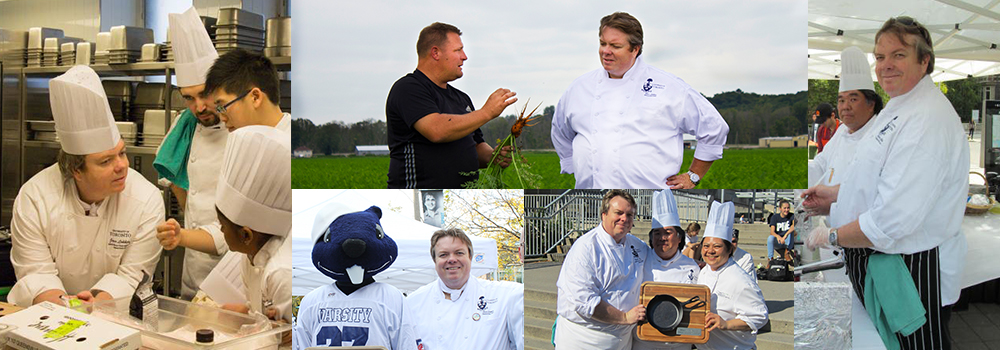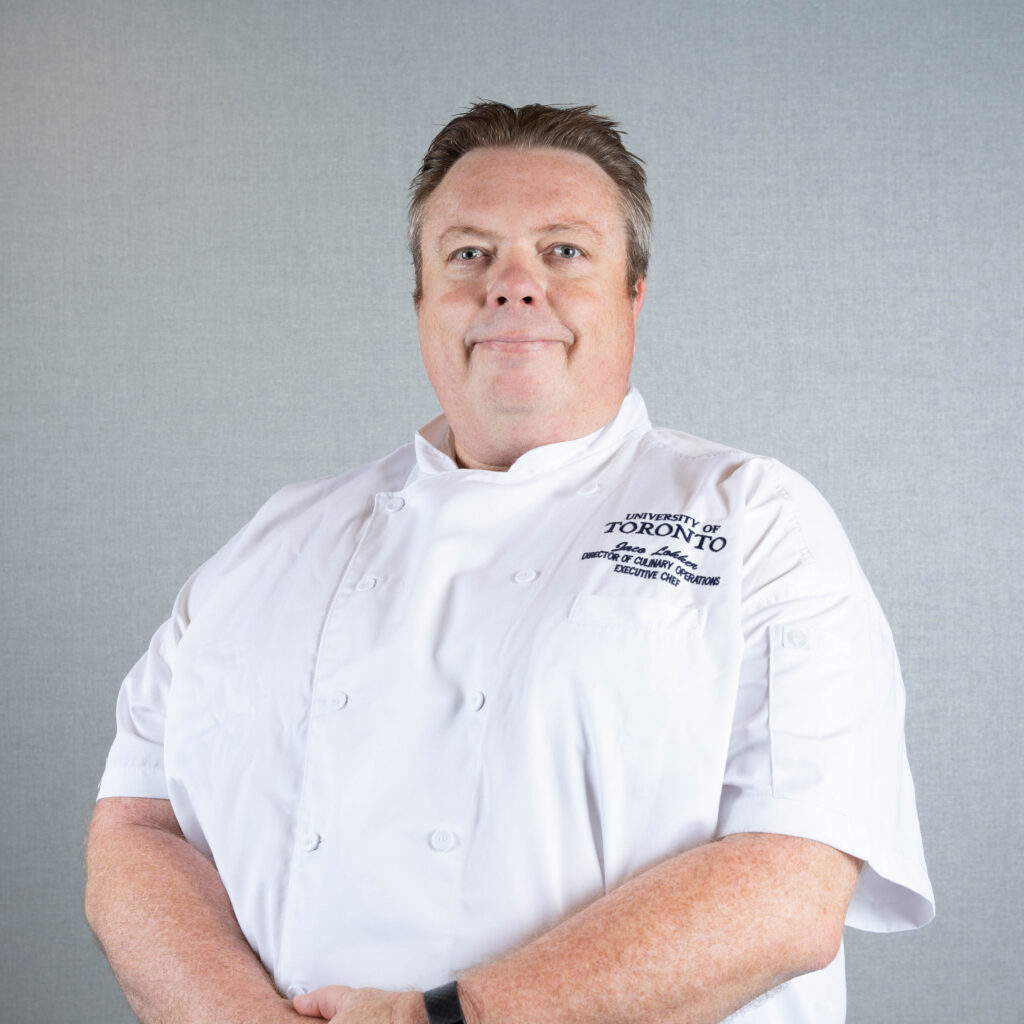
Director of Culinary Operations & Executive Chef
Chef Jaco Lokker

Originally from the Netherlands, Chef Jaco apprenticed under Canadian Chef Hans-Ulrich Herzig at the Prince Hotel in Toronto. Chef Jaco worked as the Executive Sous Chef and Executive Chef at several renowned hotels and clubs, such as the King Edward Hotel and the Islington Golf Club.
In 2003, Chef Jaco became the Director of Food Services at the University of Toronto, where he implemented award winning environmental, sustainable and local food programs.
Chef Jaco has been the recipient of numerous awards, including the 2001 Escoffier Award for outstanding contributions to the Culinary Arts and he was the 2002 Escoffier Society Chef Member of the Year. Chef Jaco and Team Canada participated and placed in the World Culinary Olympics in Erfurt, Germany, earning 2 gold medals in 2002 and second place in 2000.
Favourite Food:
Pasta, Pasta and more Pasta
Favourite Food Services Event:
Mac’N Cheese Smackdown
Q & A with
Chef Jaco
How did you initially become interested in cooking, and why did you become a chef?
My interest in cooking started when I was young as I would always help my grandmother in the kitchen. She was very passionate about food and worked within the industry herself. I can vividly remember what her food tastes like and smells like to this day.
I took this interest one step further and sought out a job at a steakhouse when I was twelve. Every week I would knock on their door asking for a dishwashing job, and eventually they gave me one. So I started working in restaurants at a very young age, maybe younger than what it should be.
From there, I went through a culinary program in high school, enjoyed it and enrolled into an apprenticeship program.
Who has been your biggest influence?
Two of the biggest influences on my career have been Chef Hans-Ulrich Herzig and Chef Judd Simpson. Chef Judd Simpson, currently the chef at the House of Commons, was one of my mentors and I still reach out to him for advice today. Chef Hans-Ulrich Herzig taught me a lot about the fundamentals of food.
What are your standards as a chef, such as sustainability?
I’d like to think that I have high standards. I believe in being responsible for food procurement. I believe in teaching our youth the fundamentals of food, how to grow our industry and how to keep it alive. To be more specific, I think apprenticeship programs are extremely important but there are not a lot of chefs that will enrol students anymore. The youth are our future, so we should be properly educating them and preparing them to take on our roles.
How does this impact your menu development?
Our menus are very much developed through looking at local food. We work a lot with local farmers, anywhere from obtaining produce to dairy to protein-based items. We have seasonal menus, but we also have menus that reflect more of a sustainable element. For instance, we will serve five different varieties of apples versus oranges. You may not see oranges all the time, but you will always see four to five different varieties of apples.
What is your personal cooking style?
I don’t know if I have a personal cooking style per se. I’m not a French chef and I’m not an Italian chef. But to me it’s simply about the basics and using fresh ingredients. If I had to pick, I would say that my style of cooking is just utilizing regional ingredients to influence my food.
What do you enjoy about working at the University?
I get to work in an environment where there are young, brilliant people that enjoy food. Today’s students are more aware of what food is and where it comes from. Being surrounded by people that are well-rounded and have knowledge about food challenges me to always work my best. It keeps my mind young, and when my mind is young, my spirit is young. So I get to walk around in this old body feeling extremely young. I think that’s part of it.
The other part of it is that it gives me the opportunity to do a lot of things that I wouldn’t be able to do in the private sector. I work a lot closer with farmers, and yes you can do that in the private sector, but not to the same level. This is because there is a lot support from the community and from the university to embrace the programs that allow us to work with farmers, and have good sustainable food practices.
Words of Wisdom for our students:
Toronto is one of the most exciting places globally when it comes to foods and flavours. So take time to explore the city, and explore the cultural foods and flavors available.
Want to learn more about Chef Jaco?
Check out other articles and interviews:
- In the Media:
- Maclean’s: U of T Tries a Fresh New Take on Residence Food
- Toronto Sun: Feeding the University of Toronto’s Student City
- U of T News: Dig into this Year’s Delish Food Choices
- The Toronto Star: Mac and Cheese gets Fancy at U of T ‘Smackdown’
- The Globe and Mail: Local-Loving Chef Changing U of T’s Eating Habits
- U of T Magazine: The Sustainable Chef




